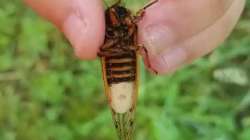This mind-controlling fungus turns cicadas into 'aroused' zombies, manipulates them to infect more
Researchers at the West Virginia Univerisity have discovered the 'Zombie cicadas'. These cicadas 'possessed' by a mind-controlling fungus drench spores that cause the same infection. Looking at this behaviour, the scientists nicknamed the cicadas as the "flying salt shakers of death".

Researchers at the West Virginia Univerisity have discovered the 'Zombie cicadas'. These cicadas 'possessed' by a mind-controlling fungus drench spores that cause the same infection. Looking at this behaviour, the scientists nicknamed the cicadas as the "flying salt shakers of death".
Massospora, the psychedelic fungus tricks the cicadas into spreading the diseases to many health counterparts.
The scientists recently described how massospora manipulates males cicadas into flicking their wings in a pattern that imitates females' mating invitations in a study. This hideous siren call lures in unsuspecting healthy males, as reported by Business Insider.
The scariest aspect of massospora is that the fungus eats away the infected cicadas genitals, butts, and abdomen, replacing them with fungal spores.
Brian Lovett the coauthor of the news study and his teams found that even though the infected cicadas can lose up to one-third of their bodies, they continue to roam, fly, and fornicate. This behavior maximizes the parasite's spread.
The researchers also said that the infection causes cicadas' libido to skyrocket as they "try to mate with everything they encounter".
The study also pinpointed when during their life cycle the cicadas may get infected. According to reports, the baby cicadas spend the first 17 years of their lives underground feeding on plant roots.
However, according to Matt Kasson, another study author, some baby cicadas could encounter the fungus as they dig their burrows.
The researchers stressed that these infected cicadas are harmless to humans.